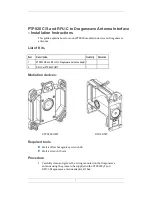
Set up
With no secondary element wire extensions attached, the
DMV-II is designed to be resonant at the top of the 80m band
(or 60m band with the option coils). This frequency is
dependent on the terrain and the height above ground. The
extension wires will move the resonance down into the
required part of the band.
The secondary element wire extensions are provided in 2
each of 5, 10, 20 & 40cm lengths and may be cascaded to
give any length up to 75cm in 5cm increments. As a rule of
thumb, at 80m, adding 5cm to each side will decrease the
resonant frequency by around 20kHz. The sides can be
unbalanced by 5cm to give more resolution if necessary.
Before first use, start with the 10cm extension wires and find
the resonant frequency using an antenna analyser or an SWR
meter and low power from your transmitter. Adjust the
lengths of the secondary wires until you have the best SWR
at the required frequency.
Once you have found the appropriate lengths for the
frequency you want to use, it is worth noting this as a starting
point for subsequent setups.
Note: the set up can be done at a lower height so that the
secondary wires can be adjusted from the ground but raising
the antenna will shift the resonant frequency up 10-20kHz
and this should be allowed for.
7
6
The DMV-II is a lightweight antenna with little wind loading
but normal precautions should be taken to secure the mast
to prevent it blowing over. The radiation pattern is generally
omni-directional and a rotator is not required.
The antenna is designed to be resonant on the required
frequency and fine tuning of the centre frequency is achieved
by adding the secondary element wire extensions. The setup
is described in the next section.
6. The feeder coax can now be
attached to the connection box
and, if not already done, the
antenna assembly may be
clamped to the mast.























